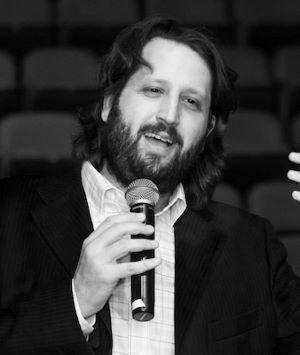Alumni Spotlight: Michel Hausmann '14
Michel Hausmann '14 is a Venezuelan-born theater director, producer and writer. He is the co-founder and Artistic Director of Miami New Drama, the resident company and operators of the historic Colony Theatre on Miami Beach. Michel is the bookwriter and director of The Golem Of Havana, an original musical, which premiered at La Mama in August of 2013, received it’s world premiere at Barrington Stage Company in July of 2014, and had a critically acclaimed run at The Colony Theatre with Miami New Drama. Hausmann's Off Broadway credits include the New York Premiere of Vassily Sigarev's Black Milk at East 13th Theater and the New York premiere of The Color Of Desire, by Pulitzer Prize winning author Nilo Cruz. In Caracas he was the Artistic Director of Palo De Agua, a leading Venezuelan theater company where he directed the world premiere of Los Navegaos, the last play by renowned Venezuelan playwright Isaac Chocrón as well as critically acclaimed productions of Fiddler on the Roof, Jesus Christ Superstar and The Producers that enjoyed an audience of 170,000 spectators. With Moisés Kaufman, he co-directed the Venezuelan premiere of Gross Indecency: The Three Trials of Oscar Wilde. Michel received a BA from Emerson College and an MFA in Theater Directing from Columbia University. Hausmann is a New York Theater Workshop 2050 Fellow, a Shubert Presidential fellow, an IRNE nominee, a Richard Rodgers Award finalist and a Knight Arts Award recipient.

Was there a specific faculty member or peer who especially inspired you while at the School of the Arts? If so, who and how?
I profoundly cherish my time at Columbia. My relationships with Anne Bogart and Brian Kulick were nothing short of enlightening, and I was incredibly fortunate to share the experience with five other extraordinary peers. But I have to say that the person who has perhaps had the greatest impact on my life and work is Gregory Mosher. His class about the future of theater in America coupled with his unique insights as both a theater director and Artistic Director of major institutions helped shape my own life in the arts. The time spent in that class and my conversations with Gregory, ultimately motivated me to move to Miami and start my own theater company, Miami New Drama at the Colony Theatre in Miami Beach. And now, I am thrilled to be able to invite Gregory to direct the American premiere of the German play, Terror, at the Colony Theater in January!
How did attending the School of the Arts impact your work and career as an artist?
Not only did the experience impact it, it jump-started it. As an artist I was constantly challenged by the extraordinary opportunity of working so closely with the master artists on the faculty and alongside my fellow peers. On a more practical level, my thesis play at the School of the Arts, The Golem of Havana, went on to be staged around the country. My time at Columbia shaped me as an artist but it also launched my life in the American theater-scene professionally.
What were the first steps you took after graduating?
Step one: freak out. Step two: panic. Then, I began to apply for artistic fellowships and assist as much as I could. I was accepted to New York Theater Workshop's 2050 fellowship and that opened up many doors. After years in the city, I realized that as much as I love New York, I felt there were just too many wonderfully talented people fighting for the very few opportunities available. I thought to myself, I live in such a big and wonderful country and theater is needed all over America. So, I looked at the only major city without a regional theater and decided to move to Miami and try to establish one.
What advice would you give to recent graduates?
My two cents is to explore the country. As much as we may be devastated by the recent election results, we must also own our share of responsibility. If we only concentrate on New York then we share the blame for the "fly-over country" that revolted in this cycle. We need to take up arms and do work that enlightens and engages audiences and we must do it in places that need to hear those stories.